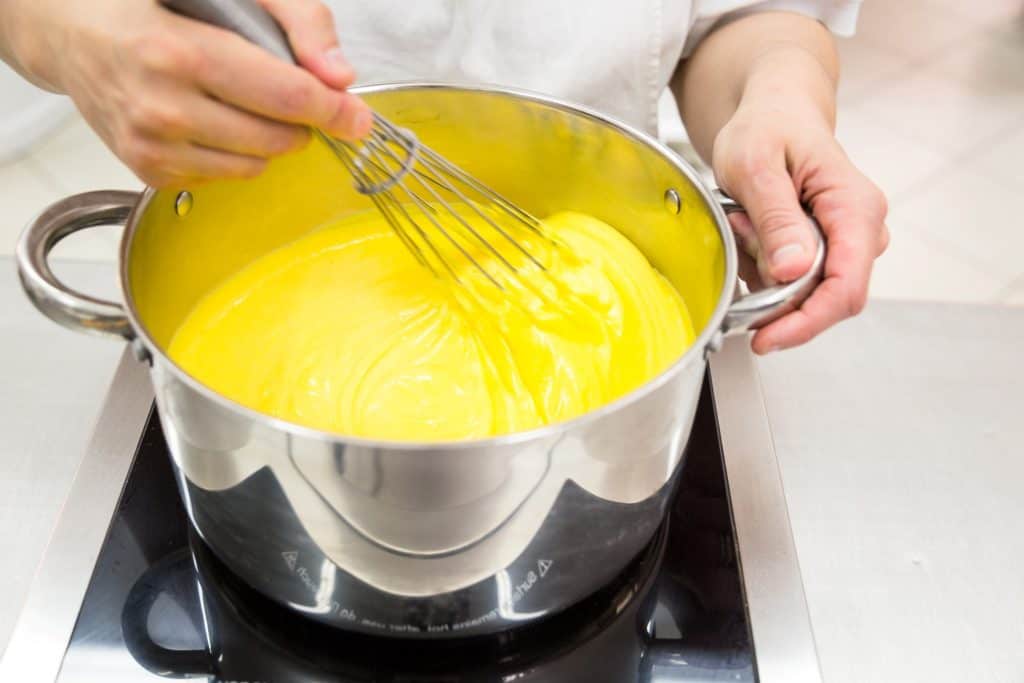Custard is awesome. It makes for a great filling, delicious sauces, and wonderful desserts. Unfortunately, having a baby on the way may demand some lifestyle changes – will this be one of them? Is it safe to eat custard while pregnant?
It’s perfectly safe to eat custard while pregnant – just remember that it isn’t healthy! Custard tends to be loaded with fat, sugar, and tons of calories, so portion control is key.
You also want to make sure that they only used pasteurized eggs for your custard, as raw eggs have a chance of carrying Salmonella bacteria. While most commercial custard won’t have this issue, you’ll have to contend with additional preservatives and flavorings.
When you’re pregnant, it’s best to assume nothing – keep yourself informed and stay healthy. We’ll go over everything you need to know about custard and pregnancy down below.
Things to Know When Eating Custard During Pregnancy
Custard – Common Ingredients and Portions

Custard is often made with a combination of milk, sugar, eggs, and vanilla extract, though some recipes may make use of thickening agents (i.e. cornstarch, flour) to improve its texture. It’s also occasionally flavored with other ingredients like fruit syrups, chocolates, and even spices!
Custard may be safe to eat while pregnant, but it’s not going to help meet your dietary needs. The calorie count alone would be bad, but the tastiest custards tend to have lots of fat and sugar. Even savory custards that don’t use much sugar (i.e. quiches) still have too much fat to eat regularly.
Health Risks

While Custard is fine for pregnant women to eat in moderation, do keep in mind that the recipe for custards usually calls for a lot of eggs. Eggs require a bit more scrutiny for pregnant women to eat, as raw eggs are liable to transmit foodborne bacteria like Salmonella.
Salmonella bacteria cause a condition known as salmonellosis, which can cause cramps, high fevers, bloody stool, and severe dehydration. All of these symptoms could hamper a pregnant woman’s quality of life – and the final two could seriously threaten their pregnancy entirely!
Treating salmonellosis in a pregnant woman may endanger the child, but the worst part of this is that the infection may also get passed onto the baby after birth! Thankfully, Salmonella is rarely fatal, but enduring it still remains an awful experience – one best avoided at all costs.
You can get around this problem by ensuring that your eggs are pasteurized. Bear in mind that washing your eggs won’t cut it, as Salmonella bacteria is sometimes passed on by the mother hens instead of environmental contaminants.
It’s also an option to substitute the eggs in your custard recipe – you may want to consider using silken tofu, coconut milk, or even applesauce! These aren’t perfect replacements though, so expect the taste and texture of your final product to differ a bit (or a lot!) from your expectations!
Homemade vs Storebought Custard
The differences between homemade and storebought custard aren’t that glaring, but you will have to take certain precautions to safely enjoy them while pregnant.
Homemade Custard
Homemade custard is usually preferred, as you’ll have an easier time managing the ingredients going into the recipe. Custard is pretty simple to make (unlike deviled eggs!), and the most work you’d have to take is ensuring that the eggs are thoroughly pasteurized.
If you refrigerate it immediately after it cools down, homemade custard can comfortably keep in the fridge for up to three days. It’s worth noting that certain additional ingredients (notably whipping cream) will curb your custard’s shelf life by a significant degree.
Storebought Custard
Storebought custard’s main advantage is that it’s simple to prepare. The eggs used for commercial products are almost always pasteurized, so you don’t have to worry about Salmonella bacteria.
Storebought custard also keeps for longer, and can easily last for several months in powder form. You only have to prepare what you plan to eat, which is very much welcome for portion control.
Storebought custard convenience comes at the cost of quality though and often lacks that richness and “oomph” homemade custard has in spades. It may also contain ingredients that are not recommended during pregnancy, such as food preservatives and artificial sweeteners.
Final Thoughts
It’s perfectly safe to eat custard while pregnant, but that doesn’t mean you’re clear to gulp down spoonfuls of it! Custard is still unhealthy to binge on, so stick to modest servings while pregnant. When making custard at home, make sure that your eggs are properly pasteurized. Otherwise, you’d be putting yourself at risk of food poisoning, with all the problems that would entail.
While we personally favor using homemade custard, storebought packs are perfectly serviceable – and certainly more convenient! The choice is yours, so stay safe and enjoy yourself.
